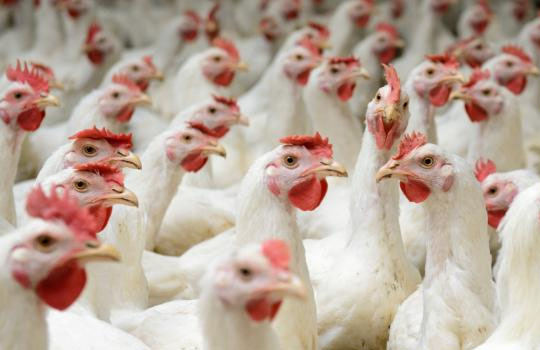HINIMOK ng isang alyansa ng poultry growers ang gobyerno na ibalik ang 40 percent tariff sa mechanically deboned meat (MDM) na siyang mandato ng World Trade Organization (WTO) agreement na kinikilala ng Filipinas.
Pansamantalang nagkaroon ng adjustment ang 40 percent tariff sa MDM ng 5 porsiyento sa 2012 bilang konsesyon sa quantitative restriction na ipinataw sa rice importation. Ang rate na ito ay magbabalik sa 40 porsiyento pagdating ng Enero 1, 2021 na nakasaad sa WTO rules.
“Since we already have a rice tariff law signed by President (Rodrigo) Duterte, it is high time that the government slap 40 percent tariff on MDM,” sabi ni Rosendo So, chairman ng Samahang Industriya ng Agrikultura (SINAG), sa isang panayam.
“Dapat ibalik na ang 40 percent na taripa sa MDM bilang proteksyon sa mga poultry growers natin (The 40 percent tariff for MDM should be returned as protection to our poultry growers),” dagdag niya.
Nauna nang sinabi ng Department of Agriculture (DA), na susulat pa sila ng isang memorandum sa Office of the President para ihayag ang posisyon ng ahensiya at agriculture stakeholders tungkol sa bagay na ito.
Kinumpirma ni DA Undersecretary Segfredo R. Serrano na nadiskubre ng Tariff Commission na ang pagbabalik ng tariffs sa MDM imports sa 2012 level ng 40 porsiyento ay hindi magkakaroon ng “substantial” economic impact.
Tinapyas ng gobyerno ang tariff sa MDM sa 5 porsiyento bilang konsesyon sa trade partners ng bansa sa pagpayag ng bansa na palawigin pa ang special treatment para sa bigas.
Sinabi ni Serrano na ang Bangko Sentral ng Pilipinas (BSP) ay may 40 porsiyento na tariff sa MDM ng kanilang inflation forecast.
Sa pag-aaral ng BSP, sinabi niya na maaabot pa rin ng gobyerno ang kanilang inflation targets kahit na ang tariff level sa MDM imports ay ibabalik sa 2012 level na 40 percent.
“Why would agriculture have to pay just so they could get few more basis points (off) the inflation rate? There is no substantial reason to maintain (the 5 percent tariff),” ani Serrano.
Sinabi niya na ang pagpapanatili ng 5 porsiyentong tariff sa MDM imports ay magpapatagal ng prejudice sa poultry subsector.
“It was a concession made at a cost to a sector so that (the said) sector should get relief,” sabi niya. “The protection should be reinstated.”
Sa magkahiwalay na pahayag, sinabi ng Alliance of Philippine Poultry Growers (APPG) na ang pagdagsa ng imported poultry products, kasunod ng pag-aalis ng gobyerno ng special safeguard duty (SSG) sa pag-angkat na ito ay nakaapekto ng husto sa Philippine poultry industry.
“The importation of chicken has become deregulated and uncontrolled. This has seriously affected local poultry raisers,” sabi ng APPG.
Ayon sa grupo, nakitsa sa datos na ang pag-angkat ng grandparent stocks ay tumaas ng 106 percent sa pagitan ng 2014 at 2018, habang ang inbound shipments ng parent stocks ay tumaas ng 68 percent. Tumaas din ang frozen chicken imports ng 74 percent noong panahon na iyon.
Sinabi ng APPG na ang sitwasyon ay lumala noong August 2018, nang alisin ng gobyerno ang SSG sa poultry imports, na nagdulot ng pagbaha nito sa domestic market, na hindi ibinaba ang presyo na retail.
“The lifting by the government of the special safeguard duty on poultry imports last August was aimed at cutting retail prices and easing inflation. However, this zero-tariff measure did not significantly reduce the retail prices of chicken meat,” pansin ng grupo.
Kahit na naalis na ang SSG, ang presyo sa palengke ay nasa PHP125 hanggang PHP160 bawat kilo.
“This obviously showed that the SSG lifting had no significant effect on retail prices, the reduction of which was the original intention,” sabi ng grupo.
Sinabi pa ng APPG na sa pag-aalis ng SSG, nakaapekto ito sa farm gate prices na nasa PHP38 per kilo, mas mababa sa cost-to-produce na PHP80 hanggang PHP85 bawat kilo sa timbang ng buhay.
“This is pushing local farmers to quit raising chicken due to huge losses,” sabi pa.
“The government has to rethink its strategy and impose import control,” dagdag pa nila.
Samantala, inangkin ng United Broilers Raisers Association (UBRA) na ang lifting ng SSG sa imported poultry ay nagresulta sa “forgone government revenues and windfall profits for importers.”
Sinabi ng UBRA na ang pag-aalis ng SSG ay nagdulot din ng pagbagsak ng farm-gate prices na mas mababa sa cost-to-produce, na hindi ibinababa ang retail prices.
Ipinakita sa datos ng Department of Trade and Industry (DTI) na sa November 2018, ang chicken leg quarter imports ay umabot sa 61,434,860 kilograms (kg), na natabunan ang 44,834,405 kg na nadala noong 2017.
Sa magkahiwalay na datos mula sa Bureau of Animal Industry (BAI) ipinakita na ang meat imports ay umakyat sa 22.7 percent noong 2018 sa record na 850,000 metric tons (MT) na ginamit bilang raw materials para sa meat processors.
Sa chicken meat imports lamang ay umakyat na ito ng 18.1 percent noong 2018 hanggang 288,202.817 MT mula sa 244,104.419 MT noong 2017.
Sa total na poultry imports, halos two-thirds ay MDM o kaya ay raw materials para sa meat processors para lamang makaprodyus ng hotdogs, sausages at chicken nuggets. PNA


Comments are closed.